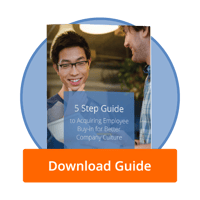Career development is an absolute must in any field. As those who work in HR, we know first hand how important a career development plan can increase both employee engagement and happiness.
In 2016, 87% of millennials said professional development and career growth opportunities are very important to them. However, in the HR field, it’s easy to only focus on other employees’ engagement, loyalty and career development. It’s important to realize that, as an employee of your company, developing your HR career is just as important.
![]() HR professionals are trained to focus on everyone else's career growth, what about their own? Read this:
HR professionals are trained to focus on everyone else's career growth, what about their own? Read this:
Keep in mind, your company isn’t going to be the one who initiates your career path or pushes you down it. They will likely approve of and encourage your efforts to improve yourself, as 52% of leaders in an HR.com study think their best talent comes from internal sources. But in the end the only one who can create your career development plan is you. So where do you start? Oddly enough, at the end.
Figure out the End Goal
First of all, don’t make a goal just for the sake of making it. It’s hard to do, but successful goal setting is vital to career development. Make goals that truly resonate with you, because you’re going to need drive and passion to stay on your career path for as long as it takes. That isn’t to say you can never change your career path (42% of employees say they expect to have three or more careers in their lifetimes), but you want to move in the right direction for as long as possible.
In addition, when you’re deciding on your ultimate goal, understand what requirements are involved. If you’re aiming for a Director of Human Resources position at a Fortune 500 company, a Master’s degree in Business or Human Resources may be required. Are you willing to go back to school to meet this goal? If not, this is your chance to re-think your plan. Understanding precisely where you want to be and how long you plan to take to get there helps to create manageable mini-goals you can accomplish over time.
5 Step Guide to Acquiring Employee Buy-in for Better Company Culture
Analyze the Path Ahead
Those who set goals are 10x more likely to succeed. Once you’ve figured out what your ultimate career goal is, you must determine what it will take to get there. The best way to do this is to look at job descriptions. Look for positions that fit your ultimate HR career goals (Director of Human Resources, International Human Resources Professional, Executive Recruiter, etc.), and analyze them. Check over a few different companies’ requirements to compare. Other things to look at when scanning other career journeys:
- Tenure at a certain company
- Length of time in specific positions
- What the recommendations say (try to find a common thread)
- Groups or associations they’re in
- Articles or work they’ve published
All of the above will help you plan your own journey. For example, a recent client mentioned they’d always wanted to get into diversity and inclusion work and realized through building her career plan that university recruitment was often a path that led to diversity work, so she started working university career fairs and helping with recruitment advertising on various campuses.
Go through some job descriptions line by line and rate yourself on how closely you match their HR skills and requirements. This will give you a concrete understanding of which skills you need to develop and which requirements you don’t yet meet. Don’t get discouraged! Again, notice the common thread between multiple job postings and the skills they list and figure out 3-5 must-haves that will likely lead to your dream job.
 #HR pros, when was the last time you thought about your own career path? Read these tips:
#HR pros, when was the last time you thought about your own career path? Read these tips:
Create actionable steps for your career development plan
Now that you’ve figured out where you’re going and what you need to get there, all you have left is to do is plot your course and make goal adjustments along the way. What barriers stand in your way? What will help you get there faster? Actionable, progressive steps will keep you moving down the path to success. Review the following for some ideas:
- Volunteer to complete challenging projects and assignments in your current position. In fact, 23% of employees say their job doesn’t take full advantage of their skills and training. Getting involved in projects that are generally outside the scope of your position will actually grow and develop those skills that are being underutilized.
- Take advantage of any and all formal training that your company offers. Ask your boss what opportunities are available. It’s likely that your company offers something, as spend on corporate training has grown to over $70 billion in the United States.
- Read and use any and all resources that are available. At ClearCompany, we pride ourselves on the amount of helpful, actionable HR resources we provide.
- Write about your experiences (use discretion) and post on industry outlets and blogs.
- Offer to speak at local or national events to share your knowledge.
- Test for certifications and join associations geared toward your industry.
- Read or listen to books about career development and future-proofing your career to get a jump on trends that might change your plan.
Defining a career path is the first step to changing your perspective on work. You’re not merely working a job anymore, you’re investing in your company, your career and yourself. It doesn’t happen overnight and needs to be reviewed and adjusted frequently, but creating a career development plan will be your greatest asset in achieving a successful HR career.
If you want more HR & talent management solutions, see how ClearCompany can make your job easier and more efficient with our complete talent management software.
Recent Posts:
.png)



